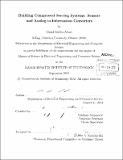| dc.contributor.advisor | Vladimir Stojanović. | en_US |
| dc.contributor.author | Salehi-Abari, Omid | en_US |
| dc.contributor.other | Massachusetts Institute of Technology. Department of Electrical Engineering and Computer Science. | en_US |
| dc.date.accessioned | 2013-04-12T19:27:22Z | |
| dc.date.available | 2013-04-12T19:27:22Z | |
| dc.date.copyright | 2012 | en_US |
| dc.date.issued | 2012 | en_US |
| dc.identifier.uri | http://hdl.handle.net/1721.1/78472 | |
| dc.description | Thesis (S.M.)--Massachusetts Institute of Technology, Dept. of Electrical Engineering and Computer Science, 2012. | en_US |
| dc.description | Cataloged from PDF version of thesis. | en_US |
| dc.description | Includes bibliographical references (p. 93-96). | en_US |
| dc.description.abstract | Compressed sensing (CS) is a promising method for recovering sparse signals from fewer measurements than ordinarily used in the Shannon's sampling theorem [14]. Introducing the CS theory has sparked interest in designing new hardware architectures which can be potential substitutions for traditional architectures in communication systems. CS-based wireless sensors and analog-to-information converters (AIC) are two examples of CS-based systems. It has been claimed that such systems can potentially provide higher performance and lower power consumption compared to traditional systems. However, since there is no end-to-end hardware implementation of these systems, it is difficult to make a fair hardware-to-hardware comparison with other implemented systems. This project aims to fill this gap by examining the energy-performance design space for CS in the context of both practical wireless sensors and AICs. One of the limitations of CS-based systems is that they employ iterative algorithms to recover the signal. Since these algorithms are slow, the hardware solution has become crucial for higher performance and speed. In this work, we also implement a suitable CS reconstruction algorithm in hardware. | en_US |
| dc.description.statementofresponsibility | by Omid Salehi-Abari. | en_US |
| dc.format.extent | 96 p. | en_US |
| dc.language.iso | eng | en_US |
| dc.publisher | Massachusetts Institute of Technology | en_US |
| dc.rights | M.I.T. theses are protected by
copyright. They may be viewed from this source for any purpose, but
reproduction or distribution in any format is prohibited without written
permission. See provided URL for inquiries about permission. | en_US |
| dc.rights.uri | http://dspace.mit.edu/handle/1721.1/7582 | en_US |
| dc.subject | Electrical Engineering and Computer Science. | en_US |
| dc.title | Building compressed sensing systems : sensors and analog-to-information converters | en_US |
| dc.title.alternative | Sensors and analog-to-information converters | en_US |
| dc.type | Thesis | en_US |
| dc.description.degree | S.M. | en_US |
| dc.contributor.department | Massachusetts Institute of Technology. Department of Electrical Engineering and Computer Science | |
| dc.identifier.oclc | 834092434 | en_US |
